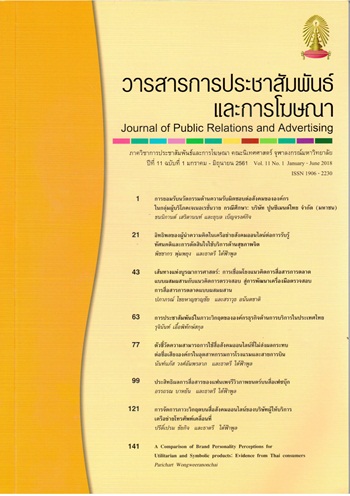A COMPARISON OF BRAND PERSONALITY PERCEPTIONS FOR UTILITARIAN AND SYMBOLIC PRODUCTS: EVIDENCE FROM THAI CONSUMERS
Main Article Content
Abstract
Brand personalities have gained attention from marketing academicians
and practitioners over three decades. Several previous studies examined the brandp ersonality traits of utilitarian and symbolic products. In addition, though there have been several brand personality studies in Thailand, little is known about the impact of these two major product categories on brand personality traits. In order to fill this gap, the aim of this exploratory research is to compare Thai consumer perceptions of five brand personality traits for utilitarian products (six brands) and symbolic products (six brands).The quantitative data were gathered with the use of a cross-sectional questionnaire survey. The sample of the study consisted of 420 Thai consumers who live in Bangkok. Proportionate stratified sampling procedures were used in this study to enhance the representativeness of the population. The brand personality measures were based on Aaker’s (1997) original brand personality scale. The product category selection followed the symbolic-utilitarian framework from Ratchford (1987) and Romero’s (2012) studies. The findings revealed that the personality perceptions for utilitarian and symbolic brands differed to some extent. The study extends the understanding of brand personality traits for utilitarian and symbolic products.
and practitioners over three decades. Several previous studies examined the brandp ersonality traits of utilitarian and symbolic products. In addition, though there have been several brand personality studies in Thailand, little is known about the impact of these two major product categories on brand personality traits. In order to fill this gap, the aim of this exploratory research is to compare Thai consumer perceptions of five brand personality traits for utilitarian products (six brands) and symbolic products (six brands).The quantitative data were gathered with the use of a cross-sectional questionnaire survey. The sample of the study consisted of 420 Thai consumers who live in Bangkok. Proportionate stratified sampling procedures were used in this study to enhance the representativeness of the population. The brand personality measures were based on Aaker’s (1997) original brand personality scale. The product category selection followed the symbolic-utilitarian framework from Ratchford (1987) and Romero’s (2012) studies. The findings revealed that the personality perceptions for utilitarian and symbolic brands differed to some extent. The study extends the understanding of brand personality traits for utilitarian and symbolic products.
Article Details
Section
Articles


